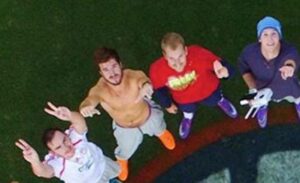 The University of Mississippi is home to one of the best collegiate athletic departments and some of the most elite Division I student-athletes in the country. Its football, tennis, rifle, and baseball teams, to name just a few, excel, and this fall its women’s soccer team reached the final 16 for the first time in its history. But the university is also home to another group of committed student-athletes. I have in mind those competing each week on teams in the university’s extensive intramural program. As a member of men’s tennis team at Ole Miss the previous four years, I had often wondered just who these athletes were and what motivated them. So, in the best spirit of George Plimpton and Paper Lion, I decided to see for myself just what intramurals had to offer and why so many of my fellow students took time out of their busy schedules to participate.
The University of Mississippi is home to one of the best collegiate athletic departments and some of the most elite Division I student-athletes in the country. Its football, tennis, rifle, and baseball teams, to name just a few, excel, and this fall its women’s soccer team reached the final 16 for the first time in its history. But the university is also home to another group of committed student-athletes. I have in mind those competing each week on teams in the university’s extensive intramural program. As a member of men’s tennis team at Ole Miss the previous four years, I had often wondered just who these athletes were and what motivated them. So, in the best spirit of George Plimpton and Paper Lion, I decided to see for myself just what intramurals had to offer and why so many of my fellow students took time out of their busy schedules to participate.
I organized my own intramural soccer team.
Amanda Alput, coordinator of Intramural Sports and Sports Clubs, and her colleagues make joining up easy. I simply logged onto the intramural league site, registered for a division and chose a name. But then I had to recruit a team, and for the first game we had only the minimum seven players, which meant we had no substitutes and no rest. I proved to be the only one who had not played intramurals before. Predictably we lost, but word soon spread that we needed more players, and by the second game we were up to ten and starting to look and play like a real team. One of the new recruits, Anthony McClinton, had even once played college soccer in Kentucky before transferring.
From the start, I was impressed with the level of commitment of all of the players and the talent of many of them. We trained regularly and hard. We pushed each other, and as the captain I felt a responsibility to make good decisions as well as pulling my weight on the field. We improved, and by the third game we had begun to believe in ourselves. We passed it around and scored some good goals, and in one game won 9-4. I scored four goals, which surprised everyone, including me. But what surprised me even more was how much we all cared about the results, but not because of any rewards. We did not want to lose because winning ensured that we could continue to play. We reached the play-offs and played great in our first knockout game. We were optimistic for the quarterfinals and began to dream about winning the whole competition. For some reason, though, we were flat in the next game, and as captain I was clueless as to what to do or say to change things. We had our chances to win but lost 2-1 to a last-minute goal.
I could not believe how disappointed I was, and I was not the only one. As Jack Mitchell, one teammate who had previously played intramural basketball said, having the chance to compete with a goal in mind, in this case winning the league championship, was one of the main reasons we had all signed up. And now we had lost. We had planned to go out after the game for a meal, but no one felt like it. If we had had a locker room it would have been like a morgue.
I felt almost as bad as when the Ole Miss tennis team lost to Notre Dame in the NCAA tournament in 2014. Our season was over. We had no more games to play. There was nothing to do but pack up our gear and trudge home. So we shook muddy hands and wished each other good luck on our finals.
I thought back to the evening in October when I first registered for the league and created our team: Expected Toulouse. I no longer cared that no one ever seemed to have gotten my joke. We had not achieved our collective goal, but I realized I felt strangely proud. We had competed. Not because we had wanted to impress a crowd. And not because we wanted public recognition or acclaim. We had competed simply because we loved playing sports. And, like all sportspeople, we liked having a goal, as teammate Jenner Jordan told me later.
I then remembered why I had wanted to participate in intramurals in the first place. We had participated for the right reasons. And, in our efforts, I realized, my teammates and I – and the hundreds of other student-athletes who had taken part in the range of intramural sports from soccer to basketball to sand volleyball – had contributed in a small but important way to the competitiveness that makes Ole Miss elite sports so great. And that has indeed proved worth acknowledging.
Story contributed by Joe Rogers, history major and journalism minor, jwrogers@go.olemiss.edu.
